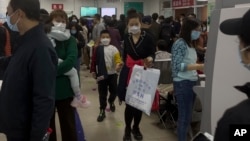Reports of rising cases of a flu-like illness in China, where COVID-19 was first detected five years ago, sparked international concerns about the potential for another worldwide pandemic.
But medical experts say the human metapneumovirus, known as HMPV, is no COVID-19.
“That’s a routine virus that commonly causes upper respiratory tract infections, such as bronchitis that might cause cough and sinuses,” says Dr. Paul Auwaerter, clinical director of the Johns Hopkins University School of Medicine’s division of infectious diseases. “I don't feel we should be especially worried about it. It is not nearly as serious as influenza or COVID disease.”
HMPV is a common virus that has been around at least since 2001. Children under five, particularly infants, and adults over 65 — especially those with health problems — can sometimes become seriously ill from HMPV. However, for most other people, the symptoms are generally mild.
“Almost everyone has been infected with this virus by the age of five,” Auwaerter says. “HMPV has been here for, you know, a long time [and] has infected millions of people that already have immunity. It's not as though this is a brand-new virus that might cause devastating problems.”
On Sunday, China said cases of HMPV had declined among residents in its northern provinces, where the respiratory infections were rising. Chinese health officials say the number of patients seeking medical help remains lower compared to the same period last year. Still, some health experts are calling for more transparency in order to reduce the spread of rumors and misunderstandings.
"International scholars are calling on China to disclose pathogen information and conduct genetic research to confirm that it is not a new virus. Even if it is an old virus, it could still be a new variant," Dr. Ho Mei-Shang, a research fellow emeritus at the Institute of Biomedical Sciences in Taipei, told VOA’s Mandarin Service.
Ho said China's COVID-19 prevention measures during the pandemic curbed the spread of diseases, which led to a decline in herd immunity, potentially causing the current surge in cases over a short time period.
Auwaerter agrees.
“They stayed home, refrained from work, wore masks,” he says. “So, the usual cycles of acquiring an infection, for example, during the respiratory season of winter, people didn't get infected. So, their specific immunity, they weren't boosted, and so there was a larger population that might be more susceptible.”
There is no real treatment or vaccine for HMPV. Doctors say any patients who have trouble breathing should seek medical help.
Chan-Long Ku of VOA's Mandarin Service contributed to this report.







